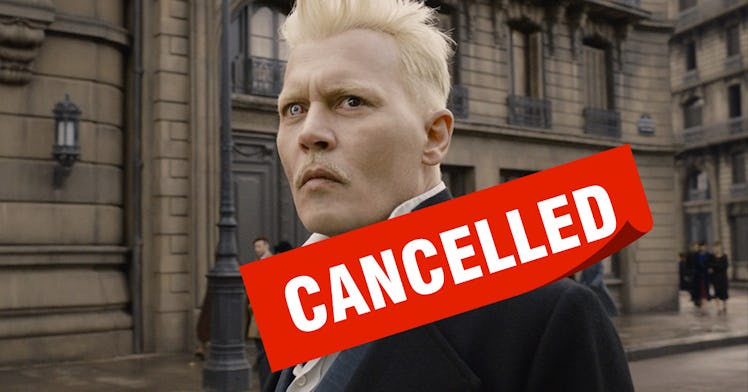It’s Time to Cancel the ‘Fantastic Beasts’ Franchise
In both its dark Wizarding World and our world, this series is for hardcore adult Potter fans only. In other words, it isn't for anyone.

If you were an adult in the early 2000s, your feelings about Harry Potter are complicated. On the one hand, it was a series of children’s books, on the other hand, every adult you knew was probably reading the books and obsessed with the movies. In the year 2003, while working at Borders Books and Music in Phoenix, Arizona, I was tasked with helping Marilyn Manson buy some CDs he was looking for (mostly the new Death In Vegas and Phoenix. Yeah, Lost In Translation had just come out, remember that?) While helping the Lord of Darkness find the CDs he needed (this is true, Manson shopped at Borders) I was wearing a promotional baseball cap adorned with the logo for Harry Potter and the Order of the Phoenix, which had just been published earlier that summer. I’ll never forget what Manson said to me: “I fucking love Harry Potter.”
I was 22 when this happened and I’ve had an irrational soft spot for Marilyn Manson ever since. But like many people who once loved Harry Potter, my fondness of that particular fictional world has warned pretty substantially in the past several years. That’s partly because Johnny Depp and J.K. Rowling have generated gross controversies, but Fantastic Beasts also leaves a bad taste in my mouth in the fictional realm. Relative to the other Potter stories, each of the two Fantastic Beasts films is about as appropriate for a grade-schooler as a Marilyn Manson album.
Both in the realm of fantasies for kids, and real-world adult politics, the Fantastic Beasts universe is no longer something that is fun to talk about at the dinner table. In the first Fantastic Beasts film, overt child-abuse was central to the narrative, and was, in fact, very clearly depicted. In the second film, a progressive same-sex relationship was depicted between the hero Dumbledore, and a Wizard Nazi named Grindelwald. Needless to say, it was not exactly a model relationship.
Plot points aside, Fantastic Beasts movies are, to put it bluntly, bad movies. In terms of convoluted plot elements, they make the George Lucas Star Wars prequels look like brilliant works of art. There’s also a huge tonal issue in these movies that feels more targeted at twentysomethings who were teenagers and tweens in the early 2000s, than actual children right now. Sure, kids might think Newt Scamander and his titular goofy monsters are cute and fun, but let’s face it, he and the “fantastic beasts” are the most forgettable part of these films. In fact, I think I like Newt Scamander better when he was Matt Smith’s version of Doctor Who. (Which is also, by the way, more appropriate for kids and Smith’s bowtie is much nicer.)
There’s an approximate quality to the Fantastic Beasts movies that makes them not only confusing but annoying. They’re kind of serious fantasy movies, but they’re also too goofy to be hardcore like The Witcher. The movies want to say something political about tolerance of people who can do magic, but they’re also period pieces, so there’s no way they can be that progressive. The stakes feel high because Newt and Dumbledore are badasses, but we know the stakes are absurdly low because this is just a giant prequel to the Harry Potter stories, which is the genuine article. In other words, if you’re a kid now, Fantastic Beasts is a complicated backstory for the main event. Basically, these movies exist for hardcore fans only. More specifically, the movies are for fan-adults. The proof? There aren’t kid heroes, which, arguably, is the thing that makes the Potter series work: It was about children as much as it was for them.
Even before we got to J.K. Rowling’s (apparent) transphobia and Johnny Depp’s (alleged) domestic abuse, there was every reason to give up on these movies. Fans were kind of grumbling and families were sort of shrugging their shoulders. Weren’t the Potter movies just big commercials for books? Wasn’t the goal to get kids to read shitty fantasy, and then, in turn, read other good books, you know, like Lemony Snicket or Ursula K. Le Guin? (Rowling basically ripped off A Wizard of Earthsea, but we don’t need to get into that.)
So now, here we are. Rowling has been all but disowned by at least half of her fans, and recently Warner Bros has announced that Johnny Depp will not return to the role of the villainous Grindelwald. Fantastic Beasts 3 will go on and there’s talk that Mads Mikkelsen will take over the role. While Mikkelsen is a great on-screen baddie, this kind of seems to miss the point, again. Most of us thought Mads Mikkelsen was a convincing villain in Casino Royale because you really believed he was smacking James Bond in the balls over and over again, and he’d probably be great as Grindelwald — in like the year 2005, in a totally different iteration of these movies.
The Wizarding World turned its back on families with the dark and adult-focused tone of the Fantastic Beasts movies. Then, Rowling and Depp made it hard for us to talk to our kids about the dark wizards behind this fiction. It’s time for us to turn in our wands and apparate into a better, and kinder magical dimension. The beasts here aren’t very fantastic, and the ones we found in the real world are disgusting.
This article was originally published on